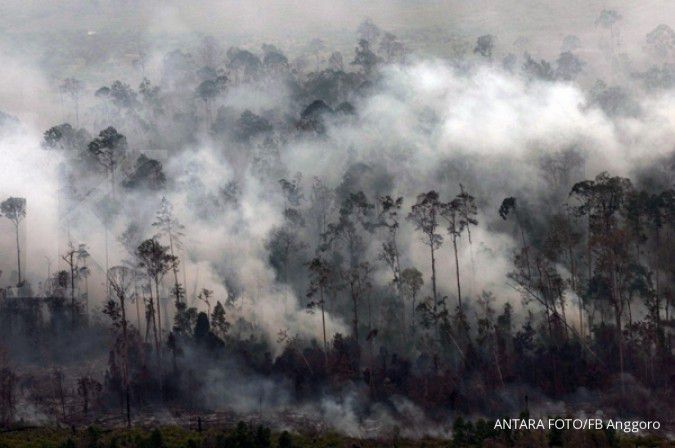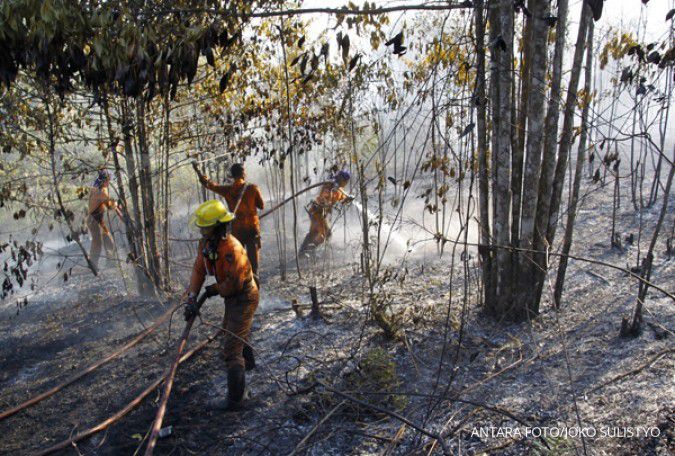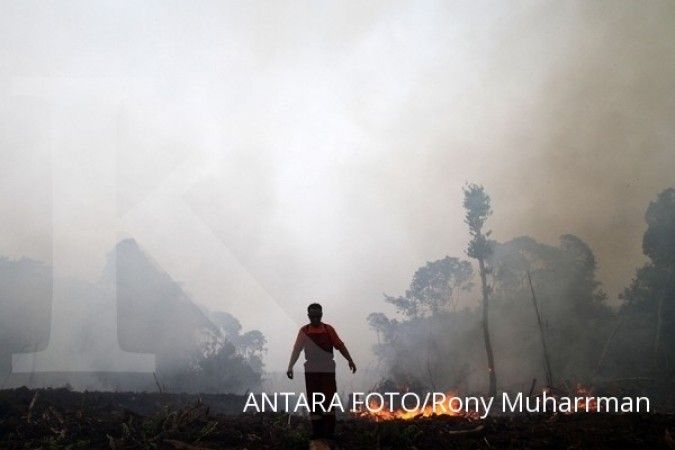JAKARTA. Indonesia has officially adopted a decade-old regional haze treaty following pressure from neighboring countries over forest fires on the islands of Sumatra and Kalimantan.
A House of Representatives’ plenary meeting on Tuesday endorsed the ratification of the ASEAN Agreement on Transboundary Haze Pollution, which obliges Indonesia, as one of the member states, to actively involve itself in efforts to mitigate air pollution, both nationally and through intensified regional and international cooperation.
“Ratifying the [regional haze] agreement is the appropriate measure for Indonesia to prove its integrity as well as step up its role in solving problems in the region,” Environment Minister Balthasar Kambuaya told the meeting.
“As a country with one of the largest areas of forest, this will help Indonesia deal with pollution in the future,” he added.
Indonesia was the only ASEAN country left to ratify the agreement, having signed the pact in 2002 along with the other member states.
The agreement was formulated as a response to an environmental crisis that hit Southeast Asia in the late 1990s, which was mainly caused by slash-and-burn clearance for agricultural purposes in Sumatra and Kalimantan.
The fires caused estimated losses of US$9 billion, mainly due to health care problems and disruption of air travel and other business activities.
The biggest palm oil-producing country aroused further anger following the spread of haze caused by land clearing in Sumatra to Singapore and Malaysia last June.
According to the Singapore National Environment Agency, the country’s air pollution rose to unhealthy levels as of Monday, as winds changed direction and brought in smoke from forest fires in Indonesia.
The government agency said on its website that the three-hour Pollution Standard Index broke above 100, which is beyond the level of unhealthy air, and remained above that level into the daylight hours.
Indonesia’s National Disaster Mitigation Agency (BNPB) reported increased smog density in Riau on Tuesday as a result of the burning of forests in the area.
BNPB has reopened its local office tasked with the management of haze and land fires in order to prepare precautions.
The country’s failure to ratify the treaty was mainly down to lawmakers’ concerns over potential breaches of sovereignty.
The majority of lawmakers, particularly from the Indonesian Democratic Party of Struggle (PDI-P) and the Prosperous Justice Party (PKS), were concerned that the treaty, which Indonesia signed during the presidency of the PDI-P’s Megawati Soekarnoputri, could infringe Indonesia’s sovereignty, as signatory states would be involved in a task force to extinguish fires, mainly on Indonesian soil, and would have to share relevant information.
During the plenary meeting on Tuesday, lawmaker Milton Pakpahan, who chairs the House’s Commission VII overseeing energy and natural mineral resources, said all the political factions at the House eventually supported the ratification.
“The decision to finally ratify the agreement is motivated by the frequent forest fires in Sumatra and Kalimantan that have caused transboundary haze pollution. Such incidents have also disrupted transportation and the economy,” said Milton, a Democratic Party politician.
By adopting the agreement, Indonesia is obliged to cooperate in developing and implementing measures to prevent and monitor transboundary haze pollution caused by land or forest fires as well as to control sources of fires.
The agreement also obliges Indonesia to respond promptly to requests for information from other member states that may be affected by such transboundary pollution.
However, no legal sanction can be imposed on any party that fails to fulfill its obligations, Article 27 of the agreement stipulating that “any dispute between parties as to the interpretation or application of, or compliance with, this agreement or any protocol thereto, shall be settled amicably by consultation or negotiation”. (Margareth S. Aritonang)
RI ratifies haze treaty
September 17, 2014, 10.17 AM
/2013/06/24/434308566p.jpg)
ILUSTRASI. Manfaat jamur enoki untuk kesehatan tubuh.
Source: The Jakarta Post
| Editor: Hendra Gunawan
Latest News
-
February 07, 2026, 04.59 PM
Indonesian Comedian Summoned by Police Over Netflix Show
-
February 07, 2026, 05.57 AM
GLOBAL MARKETS-Stocks, Bitcoin Rally, Regaining Some Lost Ground with Precious Metals
-
February 06, 2026, 07.58 AM
Indonesian Markets Face More Pressure after Moody's Cuts Outlook
-
February 05, 2026, 07.19 PM
Moody's Cuts Indonesia's Sovereign Rating Outlook to Negative
-
February 05, 2026, 02.43 PM
Indonesia Posts Fastest Economic Growth Rate in Three Years
-
February 04, 2026, 04.38 PM
Indonesia's Tax Revenues Jump in January, Finance Minister Says
-
February 04, 2026, 03.34 PM
AUD 1.6 Trillion Australian Pension Funds Ready to Pour into Indonesia
-
February 04, 2026, 02.13 PM
Indonesian Miners Halt Spot Coal Exports Over Proposal to Cut Output
-
February 04, 2026, 12.39 PM
Emerging Asia Stocks Waver as AI Selloff Bites, Seoul Hits Record High












